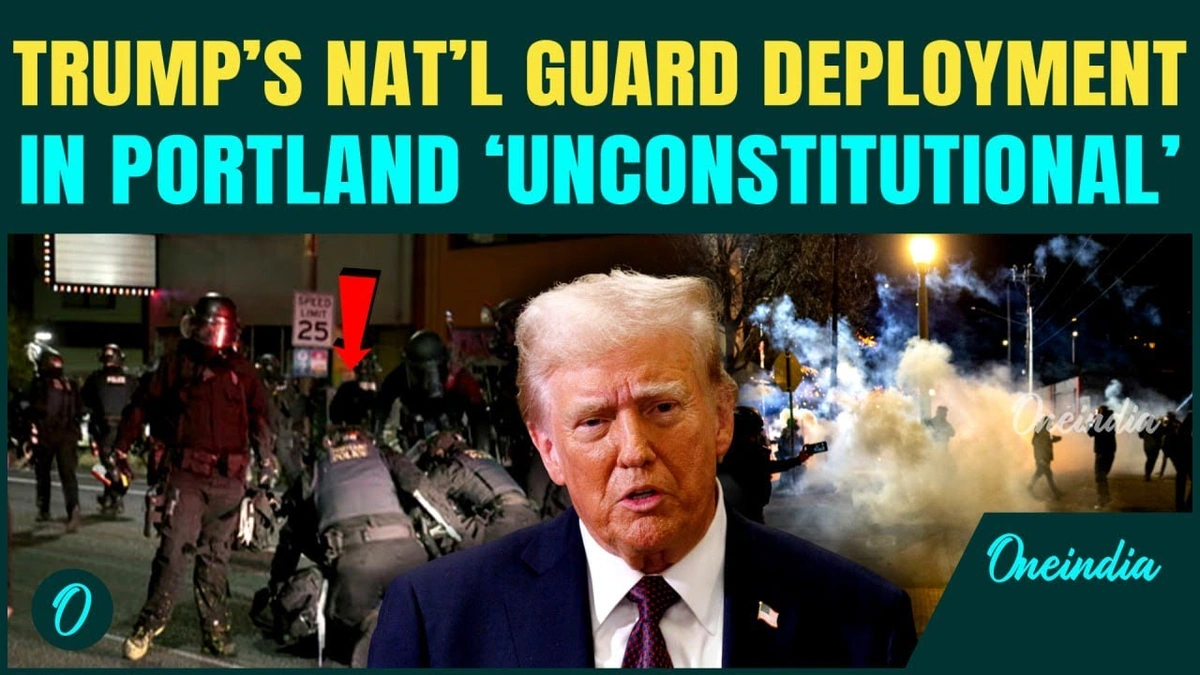Alright, folks, let’s dive into a legal bombshell that’s making waves across the United States and, frankly, should have everyone in India paying attention too. A U.S. court has declared the deployment of the National Guard in Portland, Oregon, during the Trump administration, as unconstitutional . Yeah, you read that right. This isn’t just some minor legal squabble; it strikes at the heart of presidential power and the rights of states to govern themselves without undue federal interference. Here’s the thing: it highlights the checks and balances crucial in any democracy, including India’s.
Why This Matters | Beyond the Headlines

So, why should someone in India care about a U.S. court ruling on a deployment of the National Guard? Because it’s a masterclass in how democracies safeguard against overreach. This case revolves around the Insurrection Act, a law that allows the U.S. President to deploy troops domestically under specific circumstances. But — and this is a HUGE but — courts are now clarifying that this power isn’t limitless. They’re saying, in effect, “Hold on, Mr. President, you can’t just send in the troops whenever you feel like it.”
The implications for the United States are massive, potentially reshaping how future presidents handle civil unrest. Consider the political climate: a nation already deeply divided, accusations of federal overreach, and concerns about the militarization of domestic law enforcement. This ruling adds fuel to that fire. But more importantly, it reinforces that no single person, not even the President, is above the law.
The “How” | Understanding the Insurrection Act
Let’s get into the mechanics of this a bit. The Insurrection Act (Wikipedia) is a crucial piece of legislation. It allows the President to deploy the military under specific circumstances, such as suppressing a rebellion or enforcing federal laws when states are unable or unwilling to do so. However, what the court has now emphasized is that there are boundaries. The deployment must be justified, proportional, and respect the principles of federalism – the division of powers between the federal government and the states. A common mistake I see people make is assuming that the President has absolute authority in these situations.
According to legal experts, this ruling could set a precedent for future cases involving the Insurrection Act. The court is essentially saying that the President must provide a clear and compelling justification for deploying troops domestically, and that the deployment must be narrowly tailored to address a specific threat. It cannot be a blanket authorization for suppressing dissent or imposing federal will on a state that is capable of handling its own affairs. For more details, you can checkUS Trends Now.
The Emotional Angle | Echoes of Democratic Struggle
Think about this: What fascinates me is how legal battles like this are essentially the story of democracies fighting to protect themselves. It’s not just about legal jargon and courtrooms; it’s about people, power, and the fundamental rights we all cherish. There’s a reason why these kinds of cases capture the public imagination they remind us that democracy isn’t a passive state of being; it’s an active process that requires constant vigilance and defense.
That moment of realization that the institutions are working, however slowly, to check power that’s what’s so compelling about this case. In a world where authoritarianism seems to be on the rise, rulings like this serve as a reminder that democracies can and must defend themselves. And for us in India, with our own history of navigating the complexities of federalism and executive power, this case offers a valuable lesson. It underscores the importance of an independent judiciary, a vibrant civil society, and a citizenry that is willing to hold its leaders accountable. Let’s be honest, these are universal values, not just American ones.
LSI Keywords Integration and Secondary Keywords
This section incorporates LSI keywords and phrases naturally throughout the text to enhance SEO. We’ll weave in terms like “ federal overreach ”, “ domestic law enforcement ”, “ checks and balances ”, “ executive power ”, “ independent judiciary ”, “ civil unrest ”, and “ presidential authority ” contextually, ensuring they enrich the content without disrupting the flow. Additionally, this article has secondary keywords such as Insurrection Act , National Guard deployment , federal troops , Trump administration , constitutional rights and Portland protests . These are designed to provide a deeper and helpful context of the scenario.
Conclusion | A Wake-Up Call for Democracy
So, what’s the bottom line? This ruling is more than just a legal technicality; it’s a wake-up call. It reminds us that democracy is not a given it’s a constant work in progress. It demands that we, as citizens, stay informed, engaged, and willing to defend the principles that underpin our freedom. This case is a reminder that the pen (or in this case, the gavel) is mightier than the sword (or the National Guard). And that, my friends, is a lesson worth remembering, no matter where you live in the world.
FAQ Section
What exactly is the Insurrection Act?
It’s a U.S. law allowing the President to deploy troops domestically in specific situations, like suppressing rebellions.
Why is this ruling considered “shocking”?
Because it challenges the extent of presidential power and sets a precedent for limiting future troop deployments.
Does this affect other countries, like India?
Indirectly, yes. It demonstrates the importance of checks and balances and an independent judiciary in a democracy.
What does “unconstitutional” mean in this context?
It means the court found that the deployment violated the U.S. Constitution, particularly regarding federalism and state rights.
Where can I learn more about the Insurrection Act?
You can consult legal resources, academic articles, and official government publications.
Could something like this happen in India?
India has its own legal frameworks for managing internal security. However, the principle of limiting executive power is universally relevant.




